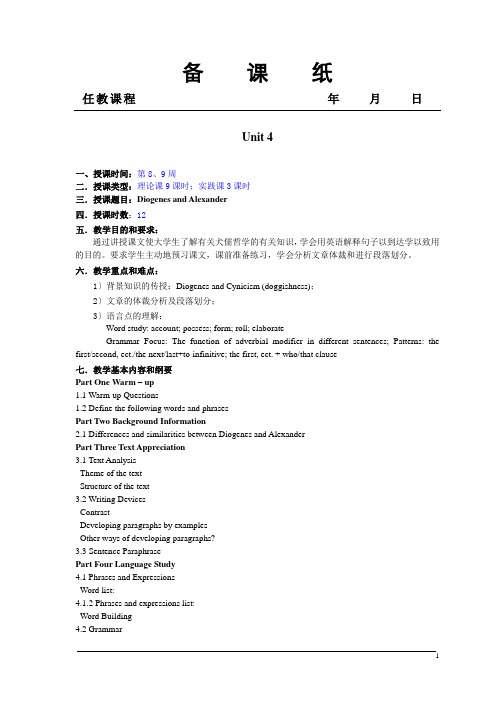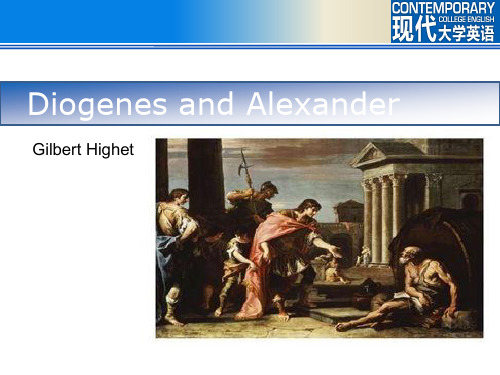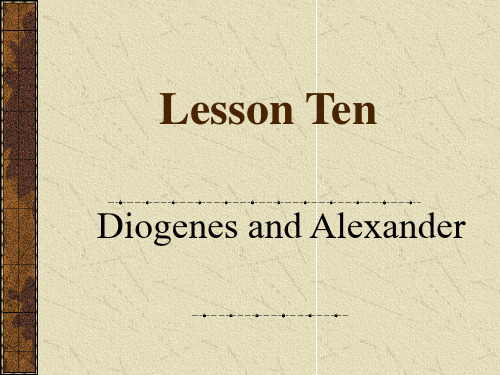精读第四课Diogenes and Alexander背景知识课件
Unit-4-Diogenes-and-Alexander市公开课一等奖省赛课微课金奖PPT课件

Introduction
➢ Both Diogenes and Alexander lived in ancient Greece more than years ago, and their stories, especially their dramatic encounter heve been told to this day. Great literate never dies. It has eternal charm. It is the same with many historical figures discussed in history. Many of them, though born and brought up hundreds or even thousands of years ago, still have direct bearing on today's realities.
➢ They have eternal importance. In fact as time goes on their revelance and importance may even increase. They never get out of date. They become part of the human inheritage we all treasure.
hand 用铲子掘取 n. a long deep spoon for holding food 勺子,铲子
18/80
Having no work to go to and no family to provide for, he was free. (para.1)
provide for a family = feed a family = raise a family
10-Unit-4-Diogenes-and-Alexander-教案讲义

任教课程年月日Unit 4一、授课时间:第8、9周二.授课类型:理论课9课时;实践课3课时三.授课题目:Diogenes and Alexander四.授课时数:12五.教学目的和要求:通过讲授课文使大学生了解有关犬儒哲学的有关知识,学会用英语解释句子以到达学以致用的目的。
要求学生主动地预习课文,课前准备练习,学会分析文章体裁和进行段落划分。
六.教学重点和难点:1〕背景知识的传授:Diogenes and Cynicism (doggishness);2〕文章的体裁分析及段落划分;3〕语言点的理解:Word study: account; possess; form; roll; elaborateGrammar Focus: The function of adverbial modifier in different sentences; Patterns: the first/second, ect./the next/last+to-infinitive; the first, ect. + who/that clause七.教学基本内容和纲要Part One Warm – up1.1 Warm-up Questions1.2 Define the following words and phrasesPart Two Background Information2.1 Differences and similarities between Diogenes and AlexanderPart Three Text Appreciation3.1 Text AnalysisTheme of the textStructure of the text3.2 Writing DevicesContrastDeveloping paragraphs by examplesOther ways of developing paragraphs?3.3 Sentence ParaphrasePart Four Language Study4.1 Phrases and ExpressionsWord list:4.1.2 Phrases and expressions list:Word Building4.2 Grammar任教课程年月日ObjectPart Five Extension5.1 Group discussion八、教学方法和措施本单元将运用黑板、粉笔、多媒体网络辅助教学设备等教学手段,主要采用以学生为主体、教师为主导的任务型、合作型等教学模式,具体运用教师讲授法、师生讨论、生生讨论等方法进行教学。
现代大学英语精读第二版book3unit4

Text Analysis
Character Analysis
Diogenes: the philosopher (para. 4)
1. “A Socrates gone mad”:
repositioning of convention below nature and reason 2. • • • Three key principles: living in accord with nature total disregard of convention independence (freedom) being the only true, lasting good
Warming up
1. Content:
Objectives
• differences and similarities between Diogenes and Alexander • Cynicism and its present significance • philosopter Analysis
Diogenes: the missionary (para. 5)
1.
•
Comparison with ordinary hermits
Similarities: Both grew tired of human society with its complications and wanted to live simply.
Background
Alexander
• Macedonian King: son of Philip
• The Thinker: student of Aristotle • The Conqueror: Greece, Asia, Egypt
卓顶精文2019-Unit-4-Diogenes-and-Alexander-教案讲义

Unit4一、授课时间:第8、9周二.授课类型:理论课9课时;实践课3课时三.授课题目:DiogenesandAlexander四.授课时数:12五.教学目的和要求:通过讲授课文使大学生了解有关犬儒哲学的有关知识,学会用英语解释句子以达到学以致用的目的。
要求学生主动地预习课文,课前准备练习,学会分析文章体裁和进行段落划分。
六.教学重点和难点:1)背景知识的传授:DiogenesandCynicism(doggishness);2)文章的体裁分析及段落划分;3)语言点的理解:Wordstudy:account;possess;form;roll;elaborateGrammarFocus:Thefunctionofadverbialmodifierindifferentsentences;Patterns:the first/second,ect./thenext/last+to-infinitive;thefirst,ect.+who/thatclause七.教学基本内容和纲要PartOneWarm–up1.1Warm-upQuestions1.2DefinethefollowingwordsandphrasesPartTwoBackgroundInformation2.1DifferencesandsimilaritiesbetweenDiogenesandAlexanderPartThreeTextAppreciation3.1TextAnalysis3.1.1Themeofthetext3.1.2Structureofthetext3.2WritingDevices3.2.1Contrast3.2.2Developingparagraphsbyexamples3.2.3Otherwaysofdevelopingparagraphs?3.3SentenceParaphrasePartFourLanguageStudy4.1PhrasesandExpressions4.1.1Wordlist:4.1.2Phrasesandexpressionslist:4.1.3WordBuilding4.2Grammar4.2.1ObjectPartFiveExtension5.1Groupdiscussion八、教学方法和措施本单元将运用黑板、粉笔、多媒体网络辅助教学设备等教学手段,主要采用以学生为主体、教师为主导的任务型、合作型等教学模式,具体运用教师讲授法、师生讨论、生生讨论等方法进行教学。
精读unit 4

爱情观
“精神恋爱”的柏拉图式的爱,这种爱认为肉体 的结合是不纯洁的是肮脏的,认为爱情和情欲是 互相对立的两种状态,因此,当一个人确实在爱 着的时候,他完全不可能想到要在肉体上同他所 爱的对象结合。柏拉图认为爱情能够让人得到升 华。他说,对活得高尚的男人来说,指导他行为 的不是血缘,不是荣誉,不是财富,而是爱情。 世上再也没有一种情感像爱情那样深植人心。一 个处在热恋中的人假如作出了不光彩的行为,被 他的父亲、朋友或别的什么人看见,都不会像被 自己的恋人看见那样,使他顿时苍白失色,失去 一切的一切,无力面对自己爱的人和爱自己的人。
柏拉图生于一 个较为富裕的贵族家 庭,他的父亲是阿里 斯通 (Ariston) 、母亲 是克里提俄涅 (Perictione) ,他的家 庭宣称是古雅典国王 的后代。柏拉图起初 打算继承家族传统而 从政,但后来情况发 生变化。 公元前399年,苏格拉底受审并被判死刑,柏拉图对现存的 政体完全失望,于是开始游遍意大利、西西里岛、埃及、 昔兰尼等地以寻求知识。据说他在四十岁时,结束旅行返 回雅典,并在雅典城外西北角创立了自己的学校—柏拉图 学院,这所学院成为西方文明最早的有完整组织的高等学 府之一,学院培养出了许多知识份子,其中最杰出的是亚 里士多德。
The ancient Greek philosopher Diogenes was a bald invective, said: "I will never return. I would appreciate your hair, he has already left you that damned head off."
政治思想
在《理想国》中,柏拉图设计了一幅正义之邦的图 景:国家规模适中,以站在城中高处能将全国尽收 眼底,国人彼此面识为度。柏拉图认为国家起源于 劳动分工,因而他将理想国中的公民分为治国者、 武士、劳动者3个等级,分别代表智慧、勇敢和欲 望3种品性。
DiogenesandAlexander第奥真尼斯和亚历山大大帝(共18张PPT)

❖ 倡导尽量少T的ex改t in变he自re然,与自然和谐共处T。ext不in h因er人e 的过多需 求去改造自然,追求清静无为,小国寡民。
犬儒主义的发展
❖ 随着犬儒理念的流行,犬儒主义的内涵发生了微妙 的根本变化。早期的犬儒主义者是根据自身的道德 原则去蔑视世俗的观念;后期的犬儒主义者依旧蔑 视世俗的观念,但是却丧失了赖为准绳的道德原则
❖ He was born in Sinope(modern-day Sinope,Turkey)and died at Corinth科林斯(希腊古城)。
❖ His father was a banker.
General Introduction
❖It is said that Diogenes aided his father in the banking business,and he became embroiled in a scandal involving the adulteration or defacement of the currency,and Diogenes was exiled from the city.From then,he lived in streets of Corinth , Athens ;And he became the prototype of Cynicism.
文化,最终对罗马产生了影响。
死因
当时记载普遍相信亚历山大是天神宙斯之子,在亚历山大出世之前,奥林匹娅斯梦见雷电,而派拉市区则有一座女神殿失火焚毁,附近人心惶惶,
几个占卜师都说是大灾难来临的前兆,此时有一人却说:“女神殿的焚毁日,已有一个男孩在同日诞生,此儿以后将要灭亡全亚洲。
Text in here
Diogenes and Alexander 现代大学英语课件

Diogenes and Alexander
Detailed Discussion of the Text
1. Introduction to Diogenes: (c.400---c.325 BC), Greek philosopher. The most famous of the Cynics, he lived ascetically in Athens (according to legend, he lived in a tub), and was accordingly nicknamed “dog”, from which the Cynics derived their name. He emphasized self-sufficiency and the need for natural, uninhibited behavior, regardless of sociare is used as a noun suffix. E.g. a few mouthfuls, a spoonful of honey; a glassful of beer
4. Everybody knew him, or knew of him: “to know of somebody” means you are quite familiar with the person whereas “to know of sb” means you have been told or you have read or heard about this person.
5. a mischievous pebble: this is an example of transferred epithet. It means a pebble from a mischievous person. “Amazed silence” (in Para 17) is another instance. More examples are:
Diogenes and Alexander 现代大学英语课件

A. I did not become a teacher by choice. I was assigned to be a teacher as was the practice in our time. But soon I began to like my job.
B. Yue Fei did not withdraw his troops by choice. He was forced to do that by twelve successive imperial edicts.
18. In order to procure a quantity of false, perishable goods he has sold the only true, lasting good, his own independence: In order to get a certain amount of material properties or worldly possessions which actually have no value and will not last, he has allowed himself to be controlled by these things and has given away his own independence which is the only thing that is true and can last.
5. a mischievous pebble: this is an example of transferred epithet. It means a pebble from a mischievous person. “Amazed silence” (in Para 17) is another instance. More examples are:
- 1、下载文档前请自行甄别文档内容的完整性,平台不提供额外的编辑、内容补充、找答案等附加服务。
- 2、"仅部分预览"的文档,不可在线预览部分如存在完整性等问题,可反馈申请退款(可完整预览的文档不适用该条件!)。
- 3、如文档侵犯您的权益,请联系客服反馈,我们会尽快为您处理(人工客服工作时间:9:00-18:30)。
第欧根尼和亚历山大
About the Author
Gilbert Arthur Highet (June 22, 1906 – January 20, 1978) was a Scottish-American classicist, academic, writer, critic and literary historian. Born in Scotland, he is best known as a mid-20thcentury teacher of the humanities in the United States. Highet devoted most of his energy to teaching, but he also aspired to raise the level of mass culture and achieved broader influence by publishing essays and books.
stotle(384 BC – 322 BC)was a Greek philosopher and polymath(博学的人), a student of Plato and teacher of Alexander the Great. His writings cover many subjects, including physics, metaphysics(形而上学), poetry, theater, music, logic, rhetoric(修辞学), linguistics(语言学), politics, government, ethics( 伦理学), biology, and zoology. Together with Plato and Socrates (Plato's teacher), Aristotle is one of the most important founding figures in Western philosophy. Aristotle's writings were the first to create a comprehensive system of Western philosophy, encompassing ethics, aesthetics, logic, science, politics, and metaphysics.
第 欧 根 尼
Plato(428/427 BC[a] – 348/347 BC) was a philosopher in Classical Greece. He was also a mathematician, student of Socrates(苏格拉底), and founder of the Academy in Athens, the first institution of higher learning in the Western world. Along with his mentor, Socrates, and his student, Aristotle, Plato helped to lay the foundations of Western philosophy and science.
Diogenes
Nothing is known about his life, but his surviving Lives and Opinions of Eminent Philosophers (《名哲言行录》)is a principal source for the history of Greek philosophy. He thought that all should live natually, for what is natural is normal and cannot possibly be evil or shameful. Live without conventions, which are artificial and false: escape complexities and extravagances(奢侈): only so can you live a free life.
On another occasion Diogenes is said to have had an interview with Alexander the Great, who opened the conversation with “I am Alexander the Great.” He answered, “And I am Diogenes the Cynic.” Alexander then asked him in what way he could serve him. “You can step out of my sunlight.” Diogenes replied. Alexander is said to have been so struck with the Cynic’s selfpossession that he went away remarking, “If I were not Alexander, I should wish to be Diogenes.”
人物思想
他认为除了自然的需要必须满足外,其他的任 何东西,包括社会生活和文化生活,都是不自然的、 无足轻重的。他强调禁欲主义的自我满足,鼓励放 弃舒适环境。作为一个苦行主义的身体力行者,他 居住在一只木桶内,过着乞丐一样的生活。每天白 天他都会打着灯笼在街上“寻找诚实的人”。第欧 根尼揭露大多数传统的标准和信条的虚伪性,号召 人们回复简朴自然的理想状态生活。
后来他师承苏格拉底的弟子安提斯泰尼,以身 作则发扬了老师的“犬儒哲学”,试图颠覆一切传 统价值。他从不介意别人称呼他为“狗”,他甚至 高呼“像狗一样活着”。人们把他们的哲学叫做 “犬儒主义”(Cynicism)。他的哲学思想为古希 腊崇尚简朴的生活理想奠定了基础。归到他名下但 现已失传的各种著作中,有对话、戏剧和一部《共 和国》,该书描绘无政府主义者的乌托邦,人们在 其中过着“自然”的生活。
According to a popular story, Diogenes walked through Athens in broad
daylight carrying a lighted lamp, saying that he was looking for an honest man.
Diogenes and Alexander
